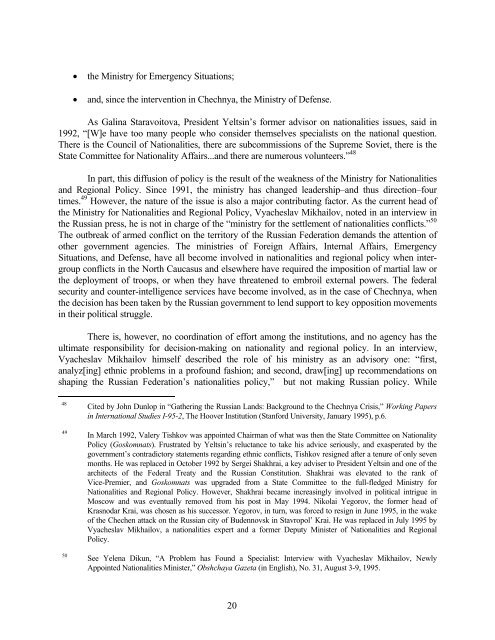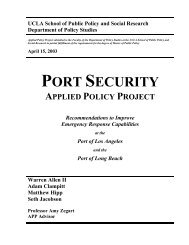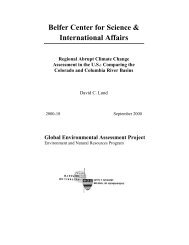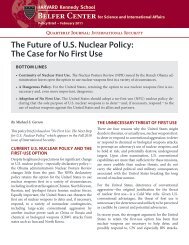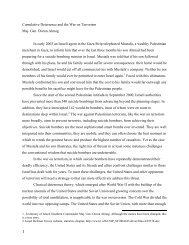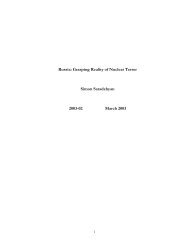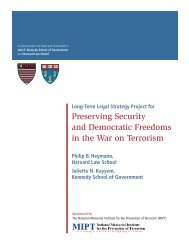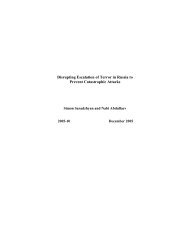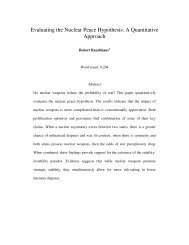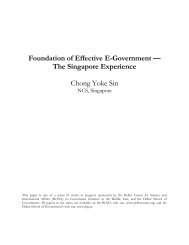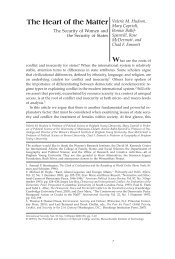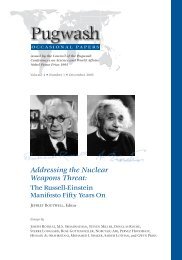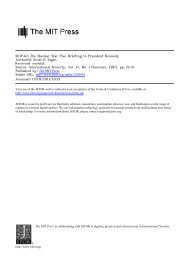RUSSIA'S TINDERBOX - Belfer Center for Science and International ...
RUSSIA'S TINDERBOX - Belfer Center for Science and International ...
RUSSIA'S TINDERBOX - Belfer Center for Science and International ...
Create successful ePaper yourself
Turn your PDF publications into a flip-book with our unique Google optimized e-Paper software.
• the Ministry <strong>for</strong> Emergency Situations;<br />
• <strong>and</strong>, since the intervention in Chechnya, the Ministry of Defense.<br />
As Galina Staravoitova, President Yeltsin’s <strong>for</strong>mer advisor on nationalities issues, said in<br />
1992, “[W]e have too many people who consider themselves specialists on the national question.<br />
There is the Council of Nationalities, there are subcommissions of the Supreme Soviet, there is the<br />
State Committee <strong>for</strong> Nationality Affairs...<strong>and</strong> there are numerous volunteers.” 48<br />
In part, this diffusion of policy is the result of the weakness of the Ministry <strong>for</strong> Nationalities<br />
<strong>and</strong> Regional Policy. Since 1991, the ministry has changed leadership–<strong>and</strong> thus direction–four<br />
times. 49 However, the nature of the issue is also a major contributing factor. As the current head of<br />
the Ministry <strong>for</strong> Nationalities <strong>and</strong> Regional Policy, Vyacheslav Mikhailov, noted in an interview in<br />
the Russian press, he is not in charge of the “ministry <strong>for</strong> the settlement of nationalities conflicts.” 50<br />
The outbreak of armed conflict on the territory of the Russian Federation dem<strong>and</strong>s the attention of<br />
other government agencies. The ministries of Foreign Affairs, Internal Affairs, Emergency<br />
Situations, <strong>and</strong> Defense, have all become involved in nationalities <strong>and</strong> regional policy when intergroup<br />
conflicts in the North Caucasus <strong>and</strong> elsewhere have required the imposition of martial law or<br />
the deployment of troops, or when they have threatened to embroil external powers. The federal<br />
security <strong>and</strong> counter-intelligence services have become involved, as in the case of Chechnya, when<br />
the decision has been taken by the Russian government to lend support to key opposition movements<br />
in their political struggle.<br />
There is, however, no coordination of ef<strong>for</strong>t among the institutions, <strong>and</strong> no agency has the<br />
ultimate responsibility <strong>for</strong> decision-making on nationality <strong>and</strong> regional policy. In an interview,<br />
Vyacheslav Mikhailov himself described the role of his ministry as an advisory one: “first,<br />
analyz[ing] ethnic problems in a profound fashion; <strong>and</strong> second, draw[ing] up recommendations on<br />
shaping the Russian Federation’s nationalities policy,” but not making Russian policy. While<br />
48 Cited by John Dunlop in “Gathering the Russian L<strong>and</strong>s: Background to the Chechnya Crisis,” Working Papers<br />
in <strong>International</strong> Studies I-95-2, The Hoover Institution (Stan<strong>for</strong>d University, January 1995), p.6.<br />
49 In March 1992, Valery Tishkov was appointed Chairman of what was then the State Committee on Nationality<br />
Policy (Goskomnats). Frustrated by Yeltsin’s reluctance to take his advice seriously, <strong>and</strong> exasperated by the<br />
government’s contradictory statements regarding ethnic conflicts, Tishkov resigned after a tenure of only seven<br />
months. He was replaced in October 1992 by Sergei Shakhrai, a key adviser to President Yeltsin <strong>and</strong> one of the<br />
architects of the Federal Treaty <strong>and</strong> the Russian Constitution. Shakhrai was elevated to the rank of<br />
Vice-Premier, <strong>and</strong> Goskomnats was upgraded from a State Committee to the full-fledged Ministry <strong>for</strong><br />
Nationalities <strong>and</strong> Regional Policy. However, Shakhrai became increasingly involved in political intrigue in<br />
Moscow <strong>and</strong> was eventually removed from his post in May 1994. Nikolai Yegorov, the <strong>for</strong>mer head of<br />
Krasnodar Krai, was chosen as his successor. Yegorov, in turn, was <strong>for</strong>ced to resign in June 1995, in the wake<br />
of the Chechen attack on the Russian city of Budennovsk in Stavropol’ Krai. He was replaced in July 1995 by<br />
Vyacheslav Mikhailov, a nationalities expert <strong>and</strong> a <strong>for</strong>mer Deputy Minister of Nationalities <strong>and</strong> Regional<br />
Policy.<br />
50 See Yelena Dikun, “A Problem has Found a Specialist: Interview with Vyacheslav Mikhailov, Newly<br />
Appointed Nationalities Minister,” Obshchaya Gazeta (in English), No. 31, August 3-9, 1995.<br />
20


